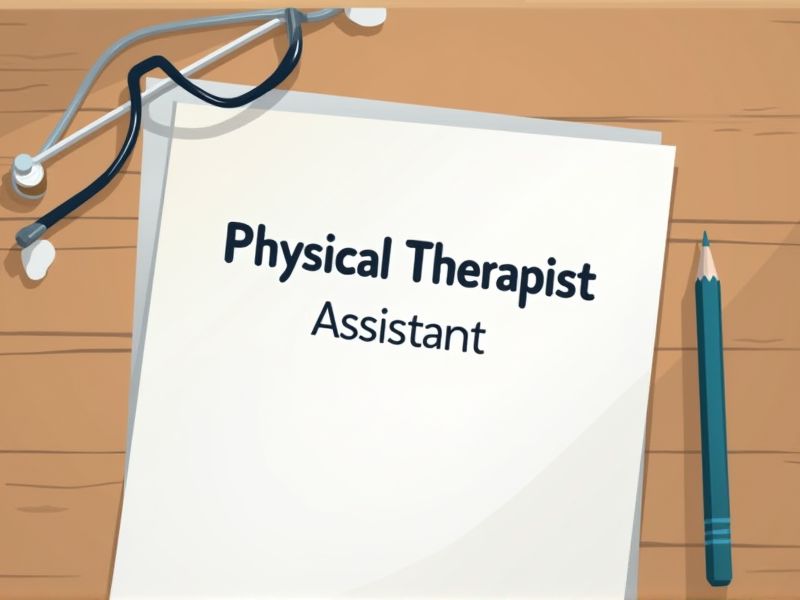
Physical Therapist Assistants (PTAs) require specific certifications to ensure they possess the necessary skills and knowledge to effectively assist in patient care. Certifications help confirm a PTA's ability to apply therapeutic interventions safely and efficiently, reducing the risk of injury. Moreover, having recognized credentials ensures compliance with industry standards and increases employability within competitive healthcare environments. Here are some essential certifications you might need as a Physical Therapist Assistant.
Licensed Physical Therapist Assistant (LPTA) Certification
The Licensed Physical Therapist Assistant (LPTA) certification ensures that PTAs possess the necessary knowledge and skills to assist effectively in patient rehabilitation. Certification establishes a standard of care and competence that protects patient safety and guarantees a consistent level of service across the profession. Being certified enhances job prospects, as many employers prefer or require licensed professionals to meet state and regulations and industry expectations. Certification typically entails continuing education, which keeps practitioners updated on evolving techniques and best practices in physical therapy.
Basic Life Support (BLS) Certification
Basic Life Support (BLS) Certification equips Physical Therapist Assistants with essential emergency response skills necessary for patient safety. This certification ensures they can perform CPR and use an AED effectively during critical situations. Regulatory bodies often mandate BLS certification as a standard requirement for healthcare professionals. Possessing this certification demonstrates commitment to patient care and can enhance employment opportunities.
Cardiopulmonary Resuscitation (CPR) Certification
Cardiopulmonary Resuscitation (CPR) certification is required for Physical Therapist Assistants (PTAs) because they often work with patients who may have compromised cardiovascular health, increasing the likelihood of emergency situations. CPR certification equips PTAs with critical life-saving skills to respond effectively when a patient experiences cardiac arrest. It ensures that PTAs adhere to safety and medical standards set by healthcare facilities and regulatory bodies, which prioritize patient safety. Requirement of CPR certification for PTAs reinforces a commitment to comprehensive patient care, instilling confidence in both colleagues and patients regarding emergency preparedness.
Advanced Cardiovascular Life Support (ACLS) Certification
ACLS certification equips Physical Therapist Assistants (PTAs) with essential skills to manage cardiac emergencies, which can arise unexpectedly during therapy sessions. Having this certification enhances a PTA's ability to respond effectively in life-threatening situations, ensuring patient safety. Many healthcare facilities prefer or require ACLS-certified staff to maintain high standards of care for patients with cardiovascular conditions. The knowledge gained through ACLS training promotes interdisciplinary collaboration, as PTAs can better communicate and coordinate with other healthcare professionals in critical scenarios.
Pediatric Advanced Life Support (PALS) Certification
Pediatric Advanced Life Support (PALS) certification equips Physical Therapist Assistants (PTAs) with necessary skills to effectively respond to pediatric emergencies, which can enhance patient safety. Having PALS certification can increase a PTA's knowledge of critical care protocols for children, aligning with healthcare standards. Employers often prefer PTAs with PALS certification, as it illustrates a commitment to comprehensive patient care and preparedness. In emergency situations, PTAs with PALS certification can collaborate more effectively with healthcare teams, improving outcomes for young patients.
Manual Therapy Certification
Manual Therapy Certification enhances a Physical Therapist Assistant's (PTA) ability to perform advanced techniques, which can lead to improved patient outcomes. Research shows certified PTAs can address a wider range of musculoskeletal issues effectively. This certification also increases job prospects since employers often prefer candidates with specialized skills. In a demanding healthcare environment, continuous educational growth through certification helps maintain industry standards.
Certified Lymphedema Therapist (CLT) Certification
Lymphedema affects millions, and specialized treatment is crucial for effective management, which necessitates certification. Becoming a Certified Lymphedema Therapist (CLT) ensures that a Physical Therapist Assistant possesses the knowledge and skills to provide competent care. The CLT certification can enhance a PTA's career opportunities by broadening their scope of practice. Earning this certification contributes to improved patient outcomes, as it equips PTAs to deliver evidence-based lymphedema management techniques.
Vestibular Rehabilitation Certification
The Vestibular Rehabilitation Certification equips Physical Therapist Assistants (PTAs) with specialized skills to manage patients suffering from vestibular disorders. This certification bridges knowledge gaps, enabling PTAs to deliver targeted care and improve patient outcomes. As vestibular disorders often lead to balance issues, certified assistants are crucial for reducing fall risks in patients. Certification also underscores a PTA's dedication to advanced practice, potentially enhancing career opportunities and professional credibility.
Geriatric Rehabilitation Certification
Geriatric Rehabilitation Certification equips Physical Therapist Assistants with specialized knowledge to address the complex needs of an aging population. This specialized training enhances the ability to manage age-related conditions such as arthritis, osteoporosis, and post-surgical recovery. Certification ensures adherence to best practices, improving patient outcomes and reducing the risk of injury or complications. In an increasingly competitive healthcare market, possessing this certification distinguishes professionals, potentially leading to career advancement opportunities and higher job satisfaction.
Certified Medical Rehabilitation Assistant (CMRA) Certification
The CMRA certification ensures that a physical therapist assistant possesses the advanced skills necessary to support rehabilitation programs effectively. With this certification, assistants are better equipped to handle diverse patient needs, directly impacting recovery outcomes positively. Hospitals and clinics often seek certified assistants, leading to increased job opportunities and career advancement. Continuous updates in certification standards keep professionals aligned with the latest rehabilitation practices and technologies.
Summary
When you obtain additional certifications as a Physical Therapist Assistant, your expertise expands significantly. This can lead to improved patient outcomes, as advanced skills often result in more effective treatment plans. You may also find increased job opportunities and higher earning potential due to specialized knowledge. The healthcare settings you work in might benefit from reduced patient recovery times, enhancing overall service quality.
